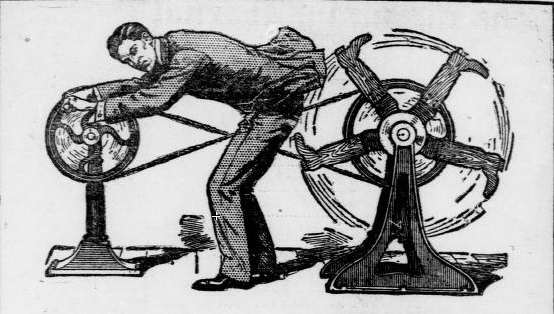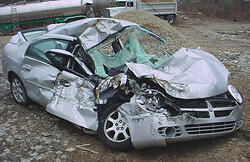 “If you could kick the person in the pants responsible for most of your trouble, you wouldn't sit for a month.” ― Theodore Roosevelt
“If you could kick the person in the pants responsible for most of your trouble, you wouldn't sit for a month.” ― Theodore Roosevelt
My car was once the victim of two accidents in a seven-day period. The first happened while I was at a stoplight and a pickup rear-ended me, damaging my bumper. A scant week later, I came out of the grocery store in time to see another vehicle, going extremely fast, hit the curb, and vault onto my parked car. The bad news was that my car was totaled. The good news (in addition to the fact that no one died) was that I hadn’t had a chance to fix the bumper yet.

Both cases were accidents, but I still harbor some animosity towards the driver who crushed my bumper. That may sound irrational—what’s a smashed bumper compared to a smashed car? But the first driver sped away when I pulled over to inspect the damage. I’m not angry about the accident, I’m angry about the failure to acknowledge responsibility.
My reaction is typical for many of us. We are generally understanding and forgiving when people make mistakes or have accidents—unless they refuse to take accountability.
This is pretty funny when you think about it because all of us have done wrong things and later claimed innocence—or worse—blamed someone else. In fact, brain science has discovered that our brains work hard to protect the internal image of ourselves as good, intelligent people. That protection includes twisting memories, distorting the actions/reactions of others, and finding root causes outside ourselves.
You may have noticed that my example of the two accidents leaves me blameless. That is typically how people view themselves, inculpable. Sadly, that is very rarely the case, even though we often convince ourselves that we have done absolutely nothing wrong. Neither wreck may have been anyone’s fault, but that’s the exception rather than the rule. Since our lives are filled with things gone awry, let’s review a few ways to be more fair-minded when we run into problems.
- Acknowledge that the brain is going to be in overdrive to keep the self-image safe. Make a conscious decision to step around the urge to justify faulty actions or find a scapegoat. Remember, it is more important to see the truth than to believe the lie of infallibility.
- Stop trying to blame someone (or everyone) else. Step back from the event and view it as objectively as possible. Think about who was affected and what their perception may be. Talk to the other people involved and ask them for their interpretation of the event. If an inner voice screams, “It’s not my fault!” tell it to quiet down and think things through.
- Own your part of the problem. It’s natural to want to hide or cover up mistakes hoping no one will notice. Someone will notice, though—and usually, it makes the person at fault look more dishonest and/or inept than if they had spoken up immediately. The sooner the error is acknowledged, the sooner it can be resolved.

So, did the driver of the fender masher get away with something? I doubt it. If her own guilt doesn’t weigh her down, Karma will get her. And if not, I have a backup plan. I’ve made a little stuffed copy of her pick-up that I’m sticking full of pins.
Smiles,
Kathy
Mistakes Were Made (But Not By Me) by Carol Tavris and Elliot Aronson
http://www.artofmanliness.com/2013/02/18/owning-up-to-mistakes/
http://www.wikihow.com/Accept-Blame-when-You-Deserve-It

-1.png)
